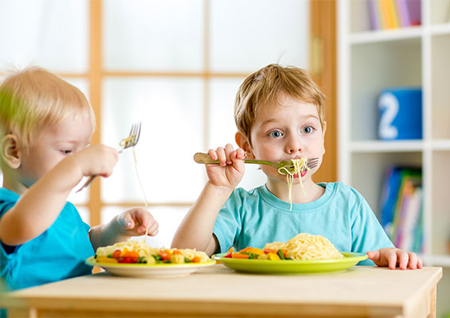“It’s vitally important that children learn the habit of healthy eating when they are young. Good eating habits last a lifetime and diet is one of the most important steps towards a lifetime of good health.” – Juliette Kellow

Nearly all children become finicky about food at some time. At some ages, this may simply be a matter of disliking certain tastes, or textures, or being more interested in playing or talking than eating. At certain ages children need less calories. Most children gain between four and five pounds a year between the ages of one and five but could go three to four months without gaining any weight at all, resulting in a decrease in appetite.
Some youngsters refuse to eat as a way of demonstrating their independence, or because they’ve learnt that it is a way of controlling their parents. This is when it can become a power struggle, or a battle of wills. Here are some tips that might help:
Eating habits:
- Consider your child’s hunger level. Most young children need four to five small meals a day (morning, mid-morning, midday, mid-afternoon and evening). If they had a healthy snack at 3:30pm, they may not have the appetite for a meal at 6:00pm. Accept that they don’t have the same appetite as you.
- Don’t allow constant snacking – if they’re allowed to nibble all day long, they will learn poor eating habits and won’t recognize their body’s hunger cues (children need to learn to eat when they’re hungry and not to eat when they aren’t).
- Avoid junk food – crisps and sweetened snacks. Not only do they spoil their appetites but the artificial flavourings can become addictive and decrease interest in more nutritious foods. However, these can sometimes be given as special treats.
Be involved:
- Model good eating habits. One of the most powerful ways your children learn what and how to eat is by observing you.
- Try to have mealtimes together as a family. Not only does this build relationships, it’s also an opportunity to provide a good role model.
- If you can’t eat together as a family, try to always sit with your child while they eat. Encourage your child to talk about things unrelated to food.
Mealtimes:
- Limit the time spent on meals – some children drag mealtimes out by playing with their food, complaining, or eating slowly. Decide on a realistic time for your child to finish eating – maybe 20-30 minutes – and set a timer. Explain that when the timer goes off, the plate will be removed. DON’T plead, urge, criticize, threaten or punish children for not eating. When the timer goes off, calmly remove the plate. If they haven’t eaten much, you could say something like, “I guess you’re not hungry today.”
- Difficult as it may be, allow them to go hungry after unfinished meals. Once they realize that time is limited and they experience the consequence of not eating, they’ll be more likely to eat at mealtimes, rather than trying to get your attention by not eating.
- Use logical consequences. If you usually serve dessert, the logical consequence of not eating their main course, is that they will miss out on dessert.
- Be consistent so your child knows you mean what you say.
- Don’t be tempted to give them something like a kit-kat, justifying it by saying, “Well, they’ve got to eat something and it’s better than not eating at all.” This will only make the situation worse.
- Serve smaller portions – less than what you think they’ll eat – this will give them a sense of accomplishment AND, it’s better for them to ask for more, than to complain about having too much.
- Introduce new foods with old favourites.
What you pay attention to, you see more of:
- Don’t give attention to not eating.
- Reward good eating and table manners. As soon as you see the behaviour you want, make sure your praise your child and state clearly what you are praising them for.
- If you have more than one child and one misbehaves at the table but the other doesn’t, praise the one who is behaving appropriately. e.g., if one is eating with their fingers, turn to the other one and say, “I’m really proud of you for eating your dinner in such a grown up way.” Paying attention to appropriate behaviour will teach children that there is little payoff for misbehaviour.
Make eating fun and relaxed:
- Involve pre-schoolers and older children in shopping, preparation and cooking.
- Present food in fun and creative ways – make mashed potatoes into an island with broccoli “trees” and gravy “sea”.
Extra Ideas:
- Turn the TV off during mealtimes. It distracts children from eating.
- Use a sticker chart to encourage appropriate meal-time behaviour, such as sitting (and staying) at the table. Keep the chart close to the dining table, or in the kitchen and stick the sticker on as soon as they’ve finished.
- Remember – praise, praise, praise.


